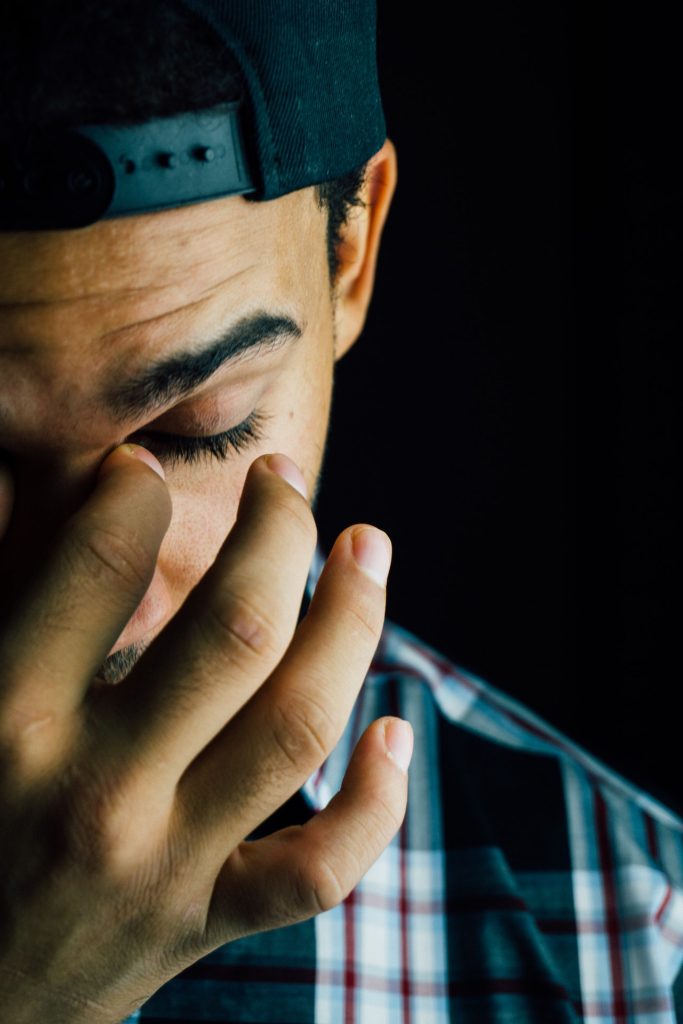How Does Alcohol Affect Men’s Health?
Alcohol is a global health issue, but research shows that it’s also a serious men’s health issue.
An estimated 16 million men in the United States have an alcohol use disorder. Men are more likely than women to binge drink, and they also have higher rates of hospitalizations and deaths. In fact, more than double the amount of men are estimated to die of alcohol-related causes every year, compared with women.
In this post, we’ll explore how alcohol impacts men’s health—including reproductive health, mental health, and liver health—and what you can do if you or a man in your life is struggling with alcohol dependence.
How Alcohol Impacts Men’s Health

Alcohol dependence can have harmful and fatal long-term health effects on the human body for anyone who drinks excessively. These harmful effects include accidents and injuries, brain damage, cancer, liver disease, and mental health issues.
Long-term heavy drinking can also have a significant impact on sexual and reproductive health. For men, alcohol can influence testosterone levels, sperm count, and sexual function. These issues can not only make conceiving a child difficult, but they can interfere with intimacy and the health of romantic relationships.
Although women may experience alcohol-related health issues more quickly than men, men experience most of these effects at higher rates overall. Here are some of the long-term health impacts of alcohol on men in particular.
Accidents and Injuries
Accidents and injuries linked to alcohol use are one of the most common ways alcohol affects men’s health. Men are more likely than women to drink excessively, and they’re also more likely to take risks like not wearing a seatbelt, abusing other substances, or getting into physical altercations.
As a man, you’re at overall greater risk than women for physical harm or accidental death related to alcohol abuse.
- Men account for a larger share of hospitalizations, and almost 75 percent of deaths linked to excessive drinking in the U.S. annually.
- Each year in the United States, there are over 33,000 fatal motor vehicle crashes. Male drivers involved in these crashes are about 50 percent more likely to have been drinking than female drivers.
- Men are three times more likely than women to die by suicide, and they are more likely to have consumed alcohol beforehand.
- In addition to personal harm, alcohol increases the likelihood of physically or sexually assaulting another person.
In short, men are more prone to risk-taking behaviors than women as a whole. If you’re a man who drinks heavily, you’re at greater risk of motor vehicle crashes, hospitalization, violence, sexually transmitted diseases, unwanted pregnancies, and even death.
Men’s Sexual Health
Sexual and reproductive health is another aspect of men’s health affected by alcohol. Excessive alcohol use increases the chance of sex with multiple partners, or unprotected sex. This can lead to consequences like unplanned pregnancies or sexually transmitted infections. Additionally, chronic heavy drinking can cause erectile dysfunction, lower men’s testosterone levels, and impact the sperm they produce—including the amount, motility, shape, and size.
Read more: Alcohol and Your Sex Life
Alcohol and Erectile Dysfunction

Research shows a link between drinking heavily and erectile dysfunction (ED). The prevalence of ED in men who drink heavily is difficult to measure, as many men don’t report it. However, many studies say most men who are dependent on alcohol have one or more sexual problems, including erectile dysfunction. Getting and maintaining an erection involves your brain, blood vessels, nerves, and hormones, and alcohol affects all these parts of your body.
Alcohol-related ED can occur temporarily after drinking. Drinking alcohol depresses your central nervous system and slows down the flow of information between your brain and penis, leading to decreased sensitivity of the penis. Alcohol also causes dehydration, which can lead to increased levels of the hormone angiotensin. Angiotensin narrows blood vessels and may limit blood flow to the penis, making it difficult to get an erection.
In the long-term, alcohol abuse can lead to cardiovascular disease and high blood pressure, which are both linked to ED. Alcohol may also damage blood vessels and the autonomic nervous system, with erectile dysfunction being a common symptom. Additionally, chronic drinking can reduce sexual desire and even lead to sexual aversion (avoiding sex).
If I stop drinking, will my ED go away?
A common question about alcohol and men’s health is, “If I stop drinking, will my ED go away?” The short answer is: Yes, if drinking is the cause of your ED. Like many health issues related to alcohol, ED is typically reversible when you stop drinking. For example, one study found that 88.5% of men with alcohol use disorder and ED showed improvement in ED after three months of abstinence from alcohol.
Men’s Reproductive Health
In addition to impacting sexual function, alcohol can have a negative impact on both testosterone and sperm.
It can change sperm volume and reduce sperm concentration (the number of sperm per milliliter of semen). Excessive alcohol use sometimes leads to misshapen sperm and increases DNA fragmentation, which is linked to lower pregnancy rates, longer time to conception, and higher miscarriage rates.
Heavy alcohol consumption in men is also associated with higher incidence of cancer, congenital heart defects, and altered reproductive development in their children.
Does Alcohol Lower Testosterone?
Men often ask, “Does alcohol lower testosterone?” Although one study suggests drinking might temporarily increase testosterone, research shows that chronic heavy alcohol consumption leads to reduced testosterone levels in the blood overall. This is because alcohol interferes with the three glands needed for the production of testosterone in men: the hypothalamus, anterior pituitary gland, and the testes.
Alcohol can shrink the testes and damage the Leydig cells in your testes, which are responsible for testosterone production. It can also interfere with the release of hormones needed to produce testosterone, like luteinizing hormone and follicle-stimulating hormone (from the anterior pituitary gland) and gonadotropin-releasing hormone (from the hypothalamus).

The follow-up question is often, “Will quitting alcohol increase testosterone?” The answer is, possibly. One study shows that after several weeks of sobriety, testosterone levels begin to increase. However, depending on your personal body chemistry and how long you’ve been drinking excessively, some damage may be permanent. More research is needed on how alcohol affects testosterone.
Can Drinking Make It More Difficult To Conceive?
Because alcohol impairs sperm production, testosterone levels, and sexual function, drinking can make it more difficult to conceive. However, research shows that moderate drinking (two drinks or less per day for men) does not have a negative impact on fertility.
The greatest negative effects happen with binge drinking (5+ drinks in a single sitting for men), especially when you do so frequently. So, if you’re trying to conceive, the safest choice is to quit drinking or stick with moderation.
Read more: Can Alcohol Stop You From Getting Pregnant?
Liver Disease Linked To Drinking
The liver is responsible for the majority of alcohol metabolism, so excessive alcohol use frequently causes issues with men’s liver health. These include fatty liver, alcoholic hepatitis, and cirrhosis.
According to the American Liver Foundation, virtually all heavy drinkers develop fatty liver. Up to 35 percent get alcoholic hepatitis, while 10 to 20 percent end up with cirrhosis. Damage from cirrhosis is irreversible and sometimes fatal.
Women may develop issues with liver health more quickly than men, but men still have higher rates of liver disease. Men are twice as likely as women to die of liver cirrhosis. In 2021, 62,039 men died from liver disease, and 50.2 percent of these deaths were linked to alcohol consumption.
Men’s Mental Health
Men frequently drink alcohol to deal with mental health issues and emotional stress, or to cope with conflicts related to work and relationships. Men are less likely than women to seek help for mental health issues, making self-medication all the more likely, and all the more damaging.
- At least six million men struggle with depression each year.
- 90 percent of individuals diagnosed with schizophrenia by age 30 are men.
- 2.3 million Americans (an equal amount of men and women) are affected by bipolar disorder, with the most common age of onset for men between 16 and 25 years.
Excessive alcohol use can cause or worsen a wide range of mental health issues, including anxiety, depression, antisocial behavior, and insomnia. Additionally, low levels of testosterone are correlated with depression, stress, and mood swings, especially among older men. Drinking can sometimes provide temporary relief from these issues. But as the effects of alcohol wear off, these issues often reemerge—only worse.
As the brain becomes dependent on alcohol, you may feel even more anxious or more depressed when not drinking. This can lead to worsening mental health and a cycle of drinking to self-medicate.
Read more: Alcohol and Your Mental Health
Options For Men Who Want To Reduce Their Drinking
Options for alcohol treatment range from traditional alcohol rehab to innovative online programs, giving you the opportunity to choose the best fit for you.
You can attend support groups like Alcoholics Anonymous, an abstinence-based program involving regular support group meetings with other people struggling with alcohol. If you want a more intensive approach, you can opt for inpatient or outpatient rehab. Inpatient rehab requires you to live in a highly structured environment for 30 days or more, while outpatient rehab allows you to live at home while getting medical and counseling support several times per week.
Typically, these options involve abstinence—giving up alcohol completely. But learning to drink in moderation is also possible. And if your busy schedule won’t accommodate traditional rehab, telemedicine offers a convenient, evidence-based alternative.
With Ria Health, you can access support groups, medication for alcohol dependence, recovery coaching, and more through an app on your smartphone. You choose whether you want to drink in moderation or quit, and we’ll develop a customized treatment plan to help you achieve your goals. Learn more about how it works, or get in touch with a member of our team today.
Will insurance cover treatment? Verify Coverage
Have Questions? Call (800) 504-5360



